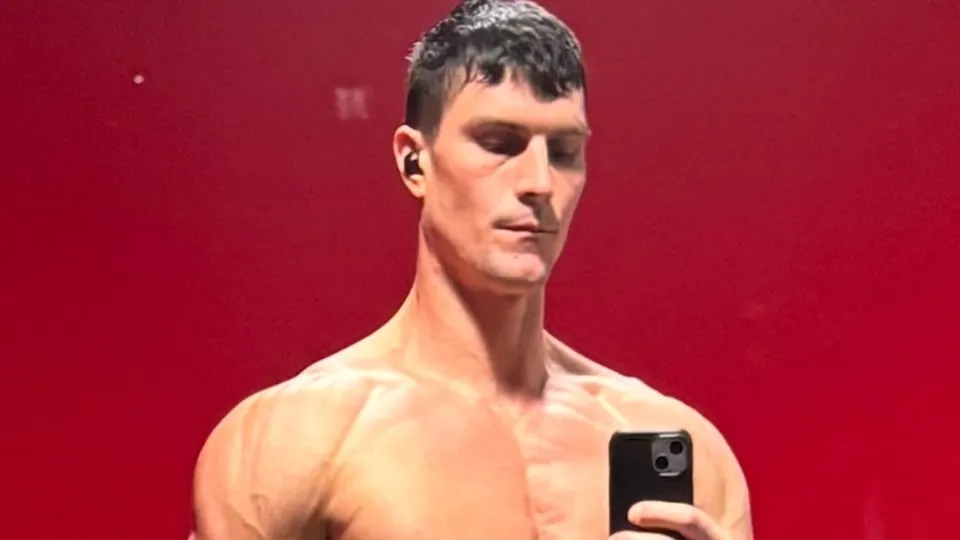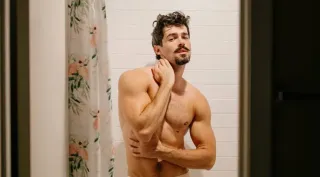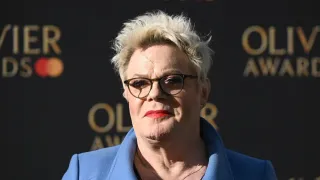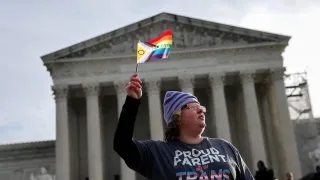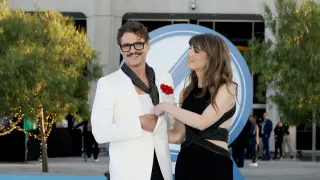March 3, 2021
Trans History's Forgotten Figure: Zackary Drucker on 'The Lady and the Dale'
Kilian Melloy READ TIME: 11 MIN.
Zackary Drucker is a transgender multi-media artist, performer, and self-described cultural producer with a passion for trans history. Even before appearing on "I Am Cait" in 2015 and producing the miniseries "This is Me," where trans people shared their stories, she had worked as a producer on the groundbreaking Amazon Prime series "Transparent."
Producer Jay Duplass – of the Duplass Brothers – had also worked as an actor on "Transparent." When Jay Duplass became involved with a docuseries about Geraldine Elizabeth "Liz" Carmichael – the entrepreneur behind The Twentieth Century Motor Car Corporation and its signature product, the lightweight, three-wheeled, and highly fuel-efficient car known as the Dale – Duplass contacted Drucker to get her involved. The project was a natural fit for Drucker, given that Carmichael was born as Jerry Dean Michael in 1937 and changed her name in the late 1960s. In a dramatic turn, Carmichael was also a con artist whose exploits included counterfeiting and years spent on the run, her family (including several young children) in tow.
EDGE: You're described as a "cultural producer," which seems appropriate, since you really are, quite literally, producing culture. Is this a calling for you? An artistic medium? Both of those things?
Zackary Drucker: I suppose it is, yeah. I'm always reaching for adequate language to describe the multi-faceted ways that I've created work, and "cultural producer" seemed to honor both my work in entertainment and art, advocacy and being a public-facing trans person.
EDGE: You're credited as a co-director for all four episodes of "The Lady and the Dale," along with Nick Cammilleri. How did you and Mr. Cammilleri divide up that work? What does it mean to "co-direct?"
Zackary Drucker: Nick pursued the story starting in 2011, and over eight years cultivated a network of people who knew Liz, including gaining access to some of her living family members, the various legal and law enforcement entities and bodies, FBI files, articles. Nick ultimately amassed this incredible archive of Liz's story, which is why the series is so detailed, and we have so much texture.
Nick paired with two producers, Ellen Baines and Andre Gaines and Allen Bain, and they approached [the] Duplass [brothers], at which point they came on board. Nick and I teamed up for the interviews; he had already done some initial interviews. Ultimately we re-shot them, to have high-quality footage. Then, I took the helm in post[-production], along with Alana Carithers, executive producer and our lead editor Chris Donlon; we carried it through to fruition in 2020. It was a little of a pass the baton kind of thing. Nick put all the resources at our fingertips.
EDGE: A central focus of your art has been to reclaim trans history and tell stories that might otherwise be forgotten. How did you first become involved here.
Zackary Drucker: I worked with Jay Duplass on "Transparent" for years, and we just finished filming the finale of "Transparent" in February 2019. Two months later, "The Lady and the Dale" ended up on Duplass Productions' doorstep and, I think, as soon as it got interest from HBO, Jay said: "[You've] gotta be a part of this project!" Like, they didn't know what the configuration would be at first, but certainly my interest and depth of knowledge in trans history, I think, made me a natural fit in their eyes; I'm very grateful for the opportunity.
I felt, after years of producing not only "Transparent" but other projects, ready to take a lead creative role, and I think this series has created an opportunity to make that leap.
EDGE: I couldn't help looking at the visual style of the series -- like the animation with photographs -- and think of your work as a multimedia artist.
Zackary Drucker: The animation producer and I went to [California Institute of the Arts] [together]. There are a few Cal Arts people in that team, so I'd been connected to some of those folks for a decade already. Because of COVID, we didn't have the option to shoot anything further [in terms of live interviews]. We thought about how Liz would tell her story. What would that look like? We were thinking it would be kind of cut with scissors, and everything would be kind of jagged lines, and that it would represent a kind of more tactile, analog style.
There was little source material of Liz; we had to be creative. I think that stories of our trans predecessors will always have that quandary: How do you tell a story with very little source material? And animation provided the perfect kind of limitless space of Liz's imagination.
EDGE: You recreated tape recordings in which we hear of Liz talking about her life – or rather, you took some of her written work and turned them into recordings. What were you looking for when you were casting the voice actor for that?
Zackary Drucker: We had less than an hour of audio of Liz, an interview that she did in, I think, early 1975, which is kind of the height of the action – the test drive, the shooting on the show room floor, Liz being outed.... It [all] happened in January of 1975. The primary tape recording we had of Liz was from that month, and we used as much of it as we could, which was quite a lot, and the other resource we had an abundance of was articles, because it was so heavily covered in the media. We really had hundreds of newspaper articles, and an abundance of quotes. We had to bring them to life.
We ultimately cast Gillian Cameron, who is a voice actor here in Los Angeles. There was a kind of gruffness to Gillian that was very Liz-like. We were not looking for somebody who sounded like Liz, we just wanted someone who could interpret and kind of embody the spirit of Liz, and in the end, somehow, they're indistinguishable. I've noticed many people cannot tell the difference between voice over Liz and real Liz.
EDGE: You mention how the media was fascinated with the story of Liz Carmichael, and a big part of that fascination was that she was transgender. There was a lot of confusion, and a little bit of doubt being cast on her as a trans person, with accusations that her living as a woman was another con.
Zackary Drucker: It was so persistent that I think Liz was written out of trans history. I never heard of Liz until Jay Duplass called me, telling me about this project, and I am a deep enthusiast of trans history! I was, like, "This person somehow slipped through the cracks." I think it's because the assertion that she was "masquerading" as a woman to avoid [prosecution for] fraud outlasted her life. I think that was the continued belief of who she was. She'd never really been identified as trans in the mainstream media, on "Unsolved Mysteries," or in the things that ended up [getting] national [attention]. Local media at the time in Los Angeles and Dallas was much more nuanced, probably just because of volume – because there was more reporting on her, more variety in ways of seeing her. It's a very curious thing that the history was never revised or looked at more carefully.
EDGE The documentary series acknowledges that Liz Carmichael broke the law, and she was a fugitive from justice. But at the same time, the series also shows that she had a way of inspiring people. Where are you hoping to place this recovered figure from trans history? Is she a villain? Is she a flawed hero, or an anti-hero?
Zackary Drucker: I would say all the above! Having gotten so close to Liz through the process of making the series, I feel like I've personally had every feeling a person could have about her. Spending so much time by Liz, I felt like I was charmed by her, also. There was a kind of contagious confidence that she had. It did rub off on me.
I think that she is her own worst enemy, in a way, and she takes on so many roles though life, it's just impossible to quantify. To track her is to sort of witness the entire arc of a person's life, in which they are heroic, and they are also flawed, and they make mistakes, they do unethical things that they compensate for later in life.
I think of other trans folks I met as they were elders, and you hear stories about when they were young, and they were cutthroat. It happened recently, I heard a bunch of stories about what a really beloved figure in my life was like in the 1960s, and matched everything that she had always said about herself – that she was bossy, mean, selfish, you know? But then, later in life, she was the most generous, kind, considerate person. And I think Liz, too, in the last chapter of her life – in Episode Four – is clearly making amends by being the matriarch of a large extended family both chosen and biological, welcoming people into her family and giving them a second change. That was her second chance.
EDGE: It seems there's a real double standard in that we admire men who break the rules, but it's a different story with women...and certainly for trans women. I wonder if that's part of why Liz Carmichael got pushed out of history's stage until now.
Zackary Drucker: Yeah. She was too complicated to figure in the pantheon of heroic women. I think that's absolutely true. She's the perfect flawed protagonist for 2021, and there are so many themes in Liz's life that have become global phenomena – the culture of narcissism, cults of personality, the kind of entrepreneurial libertarianism of Elon Musk or Elizabeth Holmes. Liz is an exciting story for all of these things that have reverberated and gotten bigger. I agree, the working class hero prototype often has excluded women, and women have been kind of written out. Anti-heroes are also usually men, with notable exceptions, in film and television history. But Liz is a completely unique character.
EDGE: In addition to being a producer on "Transparent" you were on "I am Cait" back in 2015, and you were a producer of the docuseries "This is Me" that same year. Since then, transgender stories have become more mainstream, but at the same time trans people and their rights are the new easy targets for politicians. I'm curious what you think about that divide that we're seeing between the cultural and political response to trans people.
Zackary Drucker: Cultural change precedes political change, usually, by 10 years, and we are maybe six or seven years in. There's a cultural legitimacy that we've seen in telling trans stories. These movements for social justice continue and resistance to them grows alongside progress, and we will live to see many gains and setbacks.
The future is always not what you expect... it's always surprising. I think it somehow is always better and worse. The fight for trans rights is a part of the larger movement toward equality, and especially feminist and gender-based equality, in that patriarchy and misogyny hurts everybody. They keep everybody in a place of restriction. Then, of course, trans folks represent a modernizing world, and we see resistance to modernization. That resistance is futile. Time moves in one direction.
"The Lady and the Dale" is streaming now on HBO.
Kilian Melloy serves as EDGE Media Network's Associate Arts Editor and Staff Contributor. His professional memberships include the National Lesbian & Gay Journalists Association, the Boston Online Film Critics Association, The Gay and Lesbian Entertainment Critics Association, and the Boston Theater Critics Association's Elliot Norton Awards Committee.
